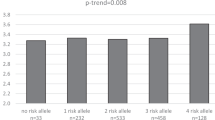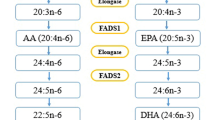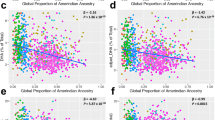Abstract
Changes in the desaturation activity of LC-PUFAs may influence insulin sensitivity by modulating the relative abundance of omega-3. The aim of this cross-sectional study was to assess the association between genetic variants of fatty acid desaturase cluster genes (FADS1, FADS2, FADS3) and insulin sensitivity in a cohort of children and adolescents with obesity. Anthropometric evaluation, lipid profile, glucose metabolism parameters and the genotype of rs1535 on FADS2 gene were assessed. In 162 obese children and adolescents (12.6 ± 2.3 years; BMI 30.9 ± 7.3), we found a significant association between an index of insulin sensitivity, i.e., Matsuda index, and rs1535 (B = −0,192; p = 0.008), BMI (B = −0,003; p < 0.001), and triglycerides (B = −0,034; p < 0.001), independent of age and sex [R² = 0.35; p = <0.001]. In conclusion, FADS cluster variants were associated with insulin sensitivity in a population of children and adolescents with obesity, contributing to identify individuals who may benefit from personalised prevention and treatment nutritional strategies since childhood.
This is a preview of subscription content, access via your institution
Access options
Subscribe to this journal
Receive 12 print issues and online access
$259.00 per year
only $21.58 per issue
Buy this article
- Purchase on Springer Link
- Instant access to full article PDF
Prices may be subject to local taxes which are calculated during checkout
Similar content being viewed by others
Data availability
The data that support the findings of this study are available from the corresponding author upon reasonable request.
References
Steinberger J, Daniels SR, Eckel RH, Hayman L, Lustig RH, McCrindle B, et al. Progress and challenges in metabolic syndrome in children and adolescents. A Scientific Statement from the American Heart Association Atherosclerosis, Hypertension, and Obesity in the Young Committee of the Council on Cardiovascular Disease in the Young; Council on Cardiovascular Nursing; and Council on Nutrition, Physical Activity, and Metabolism. Circulation. 2009;119:628–47.
Neuenschwander M, Barbaresko J, Pischke CR, Iser N, Beckhaus J, Schwingshackl L, et al. Intake of dietary fats and fatty acids and the incidence of type 2 diabetes: a systematic review and dose-response meta-analysis of prospective observational studies. PLoS Med. 2020;17.
Vaittinen M, Männistö V, Käkelä P, Ågren J, Tiainen M, Schwab U, et al. Interorgan cross talk between fatty acid metabolism, tissue inflammation, and FADS2 genotype in humans with obesity. Obesity. 2017;25:545–52.
Zhang YY, Liu W, Zhao TY, Tian HM. Efficacy of omega-3 polyunsaturated fatty acids supplementation in managing overweight and obesity: a meta-analysis of randomized clinical trials. J Nutr Heal Aging. 2017;21:187–92.
Harslfø LBS, Larsen LH, Ritz C, Hellgren LI, Michaelsen KF, Vogel U, et al. FADS genotype and diet are important determinants of DHA status: a cross-sectional study in Danish infants. Am J Clin Nutr. 2013;97:1403–10.
Maguolo A, Zusi C, Giontella A, Miraglia Del Giudice E, Tagetti A, Fava C, et al. Influence of genetic variants in FADS2 and ELOVL2 genes on BMI and PUFAs homeostasis in children and adolescents with obesity. Int J Obes. 2020;45.
Wu JHY, Micha R, Imamura F, Pan A, Biggs ML, Ajaz O, et al. Omega-3 fatty acids and incident type 2 diabetes: a systematic review and meta-analysis. Br J Nutr. 2012;107:S214–27.
Aldámiz-Echevarría L, Prieto JA, Andrade F, Elorz J, Sanjurjo P, Soriano JR. Arachidonic acid content in adipose tissue is associated with insulin resistance in healthy children. J Pediatr Gastroenterol Nutr. 2007;44:77–83.
Kim W, Deik A, Gonzalez C, Gonzalez ME, Fu F, Ferrari M, et al. Polyunsaturated fatty acid desaturation is a mechanism for glycolytic NAD+ recycling. Cell Metab. 2019;29:856–.e7.
Kwong RY, Heydari B, Ge Y, Abdullah S, Fujikura K, Kaneko K, et al. Genetic profiling of fatty acid desaturase polymorphisms identifies patients who may benefit from high-dose omega-3 fatty acids in cardiac remodeling after acute myocardial infarction—post-hoc analysis from the OMEGA-REMODEL randomized controlled trial. PLoS One. 2019;14:1–17.
Funding
The study was funded by the University of Verona, Verona, Italy (grant name: FURMAFF).
Author information
Authors and Affiliations
Contributions
AMa, CZ, MC and EF researched and analysed data; AMa, CZ, and FE wrote the manuscript. AMo and CM edited the manuscript and provided substantial contribution to the overall discussion. CM is the guarantor of this work and takes responsibility for the integrity and the accuracy of the data analysis.
Corresponding author
Ethics declarations
COMPETING INTERESTS
The authors declare no competing interests.
Ethical approval
The Institutional Ethics Committee of Verona (Italy) approved the protocol. Informed consent was obtained from the children and their parents.
Additional information
Publisher’s note Springer Nature remains neutral with regard to jurisdictional claims in published maps and institutional affiliations.
Rights and permissions
Springer Nature or its licensor holds exclusive rights to this article under a publishing agreement with the author(s) or other rightsholder(s); author self-archiving of the accepted manuscript version of this article is solely governed by the terms of such publishing agreement and applicable law.
About this article
Cite this article
Maguolo, A., Zusi, C., Corradi, M. et al. FADS cluster variants are associated with insulin sensitivity in children and adolescents with overweight and obesity. Eur J Clin Nutr 76, 1776–1778 (2022). https://doi.org/10.1038/s41430-022-01187-2
Received:
Revised:
Accepted:
Published:
Issue Date:
DOI: https://doi.org/10.1038/s41430-022-01187-2



